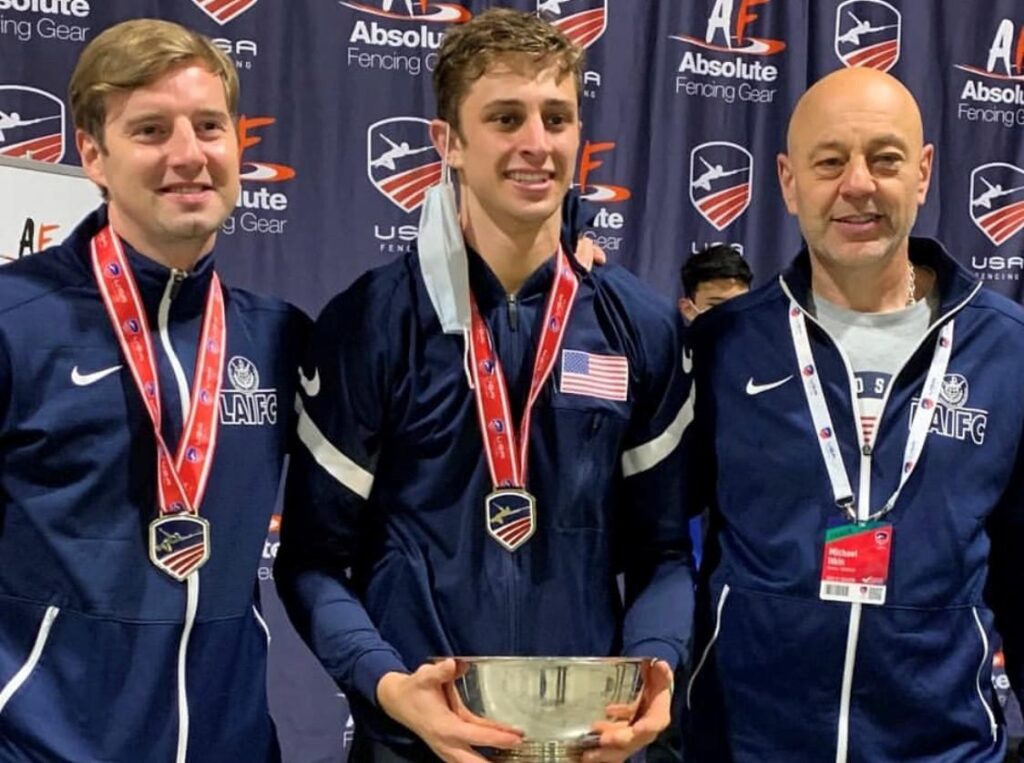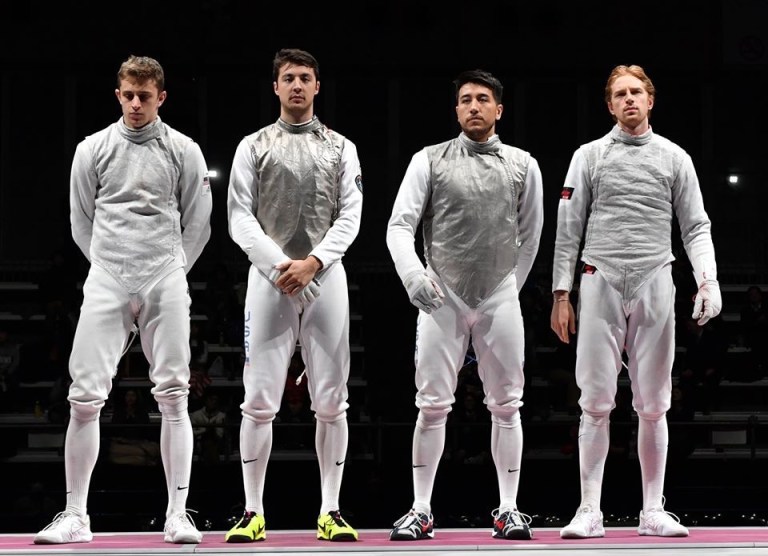
Palisades High School grad Nick Itkin (center) won won his third Div. I National Championship title in Philadelphia less than three weeks before the Tokyo Olympic Games. Photo Credit: LAIFC.
Nick Itkin, a Palisades High graduate, will compete in the Tokyo Olympic Games as the world’s No. 9-ranked men’s foil fencer in the individual event and as a member of a team favored to win gold.
Although he started fencing when he was 7, Itkin didn’t win his first Division 1 Men’s Foil National Championship until 2017, when he was 17. But since then, he has captured six more gold medals on the national circuit, and in 2020, he won a gold medal at the World Cup tournament in Paris, becoming the youngest fencer ranked in the world’s top l0.
In 2020, a writer for the Academy of Fencing Masters asked Itkin about parents who put too much emphasis on winning in youth sports.
“I think it’s a huge problem in the States,” said Itkin, who has dual citizenship: United States and Ukraine. “People are still growing. Imobden, he had a late peak. He was not too good in the youth. I think I’m still young too. I still have a lot of room to improve. Especially in the youth you’re still learning and trying to get better. You’re still trying to grow and get better as a fencer. It shouldn’t be too important to focus on the results at that point.”
On July 31, Itkin and his three foil teammates will begin their quest for gold in the quarterfinals. Itkin, who is 6-2, 156 pounds, was asked who he thought would be the most dangerous team opponent.
“Italy, France, and Russia,” he said. “All of those teams are a real threat. If I had to say one team, I’d say Italy.”
The son of Michael and Tatyana Itkin, he is now a junior at Notre Dame College. His father, who has also served as his coach, is a former elite fencer from Ukraine. His mother was a member of Ukraine’s rhythmic gymnastics team and his older sister Julia was a U.S. National Team member in rhythmic gymnastics.
“My father introduced the sport to me when I was about seven,” Itkin said in an interview with the International Fencing Federation. “I love this sport more than anything. My life revolves around fencing. There is no better feeling than overplaying my opponent and scoring a nice touch.
“I am really lucky to have this relationship with my father where he is my coach and my father. He wants it as much as I do. On the side of the strip, his emotion is just so strong and that helps me and encourages me, and it hypes me up. He’s originally from Ukraine and we speak Russian together. It’s pretty funny as he always coaches me in Russian unless my opponent is Russian, then he coaches me in English.”
In addition to his father, Itkin’s USA team coach is Igor Zapozdaev and his college coach is Buckie Leach.
Itkin said that he loves sports in general, and always loved playing sports. “When I was a kid, I would go out and play soccer or basketball.”
After graduating from Palisades High in 2017, he enrolled at Notre Dame and is majoring in political science with a minor in business economics.
A July 18 L.A. Times story about Itkin (“SoCal Phenom Nick Itkin Could Help Americans Win First Olympic Team Fencing Title”) stated:
“In fencing, as with dance or debate, timing is everything. Fencers are looking for what they call ‘the moment’ — the instant when their opponent relaxes or appears off-balance. That’s when to attack.
“‘The best fencers are physically strong but they’re a lot smarter as well,’ Itkin said. ‘That’s when the fencing becomes trickier.’”
The Times noted that many of the top-ranked foilists are in their late 20s and early 30s. Itkin, 21, had gained a reputation for technique, but needed to overcome a tendency to rush.
He told the Times, “It was a dream and a plan that I always had,” referring to the Olympics. “I just didn’t expect it this soon.”
Americans have been ranked No. 1 in the world for four of the past five years (and one captured a bronze at the 2016 Rio Games). If they win in Tokyo, they will be the first American team to win an Olympic title in team fencing.

Nick Itkin (left) with the USA Foil Dream Team (left to right)-Gerek Meinhardt, Race Imboden and Alex-Massialas. They hope to win a gold at the 2020 Tokyo Olympics.
